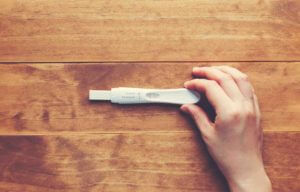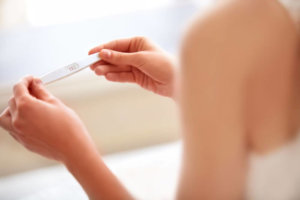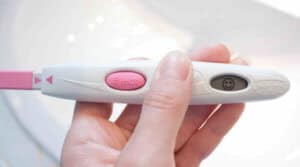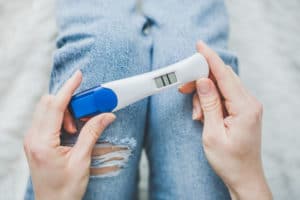Have you been feeling strangely nauseous for a few days, maybe you even had to throw up in the morning? Do you feel a strange pressure in your lower abdomen or do your breasts hurt, as if your period is coming soon? Then it could be that you are pregnant.
In this article you will learn what happens to you and your body in early pregnancy, what development the baby in your belly goes through, and what you should pay attention to now.
In addition, the article provides practical tips and advice, for example, on finding a midwife or what you can do about the unpleasant side effects of pregnancy.
Table of contents
Am I Pregnant? Typical Signs Of Early Pregnancy
If you want a baby, you are probably eagerly awaiting the first signs of early pregnancy. The moment when the pregnancy test finally shows the longed-for positive result is a very special one.
Some women suspect early on that they might be pregnant, others are surprised quite late in the pregnancy. In this section, you will learn which signs indicate an early pregnancy, how safe they are, and from when you can perform a pregnancy test.
When Do The First Signs Of Pregnancy Appear?
Some women think they can feel fertilization right at conception and “know” they are pregnant. Sometimes this may actually be true thanks to female intuition, but in most cases, this “knowledge” is probably more wishful thinking. This is because fertilization of the egg does not occur immediately at or shortly after conception, but only a few hours to days later.
The sperm must first travel a long way before they can reach the egg and fertilize it. Only after fertilization and with the onset of cell division does the egg make the arduous journey to the uterus. After another four to five days, it nests in the uterus. Only here does the development into an embryo begin and with it the actual early pregnancy.
In the first two weeks of early pregnancy you are not yet pregnant, because the counting of the weeks of pregnancy begins with the first day of the last menstrual period. This information in summary means that you will actually notice the first signs of your early pregnancy from the fourth to fifth week.
However, these are still very uncertain and may also indicate an impending period. In fact, fertilization may have occurred after your last sexual intercourse and you may have been pregnant briefly.
However, many fertilized eggs are rejected during this very early phase of early pregnancy or do not nest at all. Normally you will not notice this, but you may be surprised by a somewhat delayed and/or particularly heavy menstrual period. This is also completely normal.
Typical Symptoms Of Early Pregnancy
The first symptoms of early pregnancy, which appear around the fourth to the fifth week, are uncertain signs. This means that their presence may well indicate pregnancy – or have entirely different causes, such as impending menstruation or an incipient gastrointestinal infection.
In addition, the signs of possible early pregnancy listed here are highly subjective. Some women notice certain physical changes particularly strongly, while others only feel a slight pulling in the abdomen, are suddenly tired all the time for inexplicable reasons – or simply feel nothing at all. Only a pregnancy test brings the longed-for certainty.
- Sensitive, swollen breasts.
- Sensitive, enlarged and darker colored nipples.
- Nausea and vomiting, typically in the morning (but not only).
- Extreme tiredness and fatigue (especially between the 8th week of pregnancy and the 12th week of pregnancy).
- Increased urge to urinate due to hormonal reasons.
- Pulling in the abdomen.
- Light spotting about five to ten days after ovulation (so-called“implantation bleeding”).
- Whitish discharge.
- Sudden sensitivity to smell.
- Mood swings.
- Increased salivation.
- Sudden disgust with certain foods.
- Sudden ravenous hunger for certain foods.
The above symptoms may or may not occur. Not every woman suffers from nausea or the notorious craving for strange food combinations in early pregnancy.
You can only be really sure when your period stops and the pregnancy test shows a positive result. By the way, some women still have a light menstrual period during the first weeks of pregnancy. Others confuse implantation bleeding with a period.
At What Point Can I Perform A Pregnancy Test?
Some pregnancy tests can be used up to four days before the calculated due date of your period. However, the result is only really reliable after your period has actually stopped. The reason for this is the concentration of the pregnancy hormone HCG in your urine, which can still be too low for a positive result at this point in early pregnancy.
It is not uncommon so early in pregnancy that you experience typical signs of early pregnancy and the pregnancy test still shows a negative result. This can happen even after your period has stopped.
In such a case, wait two or three days and then repeat the test. By the way, the result will be more reliable if you use morning urine for the pregnancy test. This is more concentrated and therefore contains a larger amount of HCG.
When Should I Go To The Gynecologist For The First Time?
Instead of a urine test at home, you can also have a blood test done by your gynecologist. The gynecologist will take blood from your arm vein and analyze it in the laboratory for the presence of HCG. The blood test provides a faster and more reliable result than the urine test but is rarely used as the first pregnancy test.
Normally, after the positive result of your home pregnancy test, you call your gynecologist and make an appointment for the first screening. Many gynecologists have their pregnant patients come to the office for the first time when the heartbeat of the unborn child should be visible in the ultrasound.
This is possible as early as the sixth week, but it is often not safe until the seventh to eighth week. You will often receive your maternity record at your first gynecologist appointment or at the latest at the twelfth week of pregnancy.
Looking For A Midwife: Better Sooner Than Later
In early pregnancy, childbirth still seems a long way off. However, for a number of reasons, it makes sense to start looking for a midwife now – preferably right after you have had the positive pregnancy test in your hand.
Perhaps this measure seems a bit exaggerated to you, but in view of the serious shortage of midwives, the advice is very sensible. Many midwives are already booked up for months, so registering as early as possible means higher chances of care for you and your baby.
Plus, the midwife can guide you through your pregnancy, answer your questions, and also do the various checkups.
What Happens To My Body In Early Pregnancy?
The changes in early pregnancy not only affect your body but also influence your psyche. Mood swings, in some women even very pronounced ones, are typical now, as are doubts and fears, by the way.
Even if you have wanted this pregnancy very much, you may suddenly feel anxious about the upcoming changes and the responsibility that comes with them. This is perfectly normal and you are not a bad mother if you sometimes wonder about the rightness of your decision.
Physical Changes
Throughout your pregnancy, your body is doing an incredible job: it is growing a living being that will later develop into an independent human being. Even in early pregnancy, your body works at full speed and adapts to the new circumstances within a short period of time:
- Your metabolism increases.
- Your metabolism increases, as does your blood volume and thus the blood flow to your organs.
- The demand for nutrients and energy also increases.
- Pelvic floor and intestinal muscles become more elastic and softer.
- As well as tendons and ligaments.
- The uterus (normally only as big as your fist) grows.
These changes in your body, which are typical of early pregnancy, can lead to unpleasant side effects such as nausea, dizziness, cravings or fatigue.
Child Development
Your child also undergoes incredible development during early pregnancy: If it actually only consists of a few rapidly dividing cells at implantation, you can actually recognize it as a child by the twelfth week of pregnancy.
At this point, your baby already has all its limbs with fingers and toes. The internal organs are also all present and already functioning. At the end of early pregnancy, your baby is about six centimeters long and weighs 14 grams.
What You Can Do About Any Pregnancy Discomforts That Occur
Fortunately, most complaints usually disappear by the end of early pregnancy – i.e. from about the 12th week of pregnancy onwards.
In the second trimester, many women feel particularly energetic and full of energy, practically as compensation for the exhausting first twelve weeks. Until then, however, you can ease the discomforts of early pregnancy with these tips:
- Nausea and morning dizziness will be less severe if you drink something before you get up (e.g. a cup of tea or a glass of lukewarm water).
- A rusk or a slice of crispbread at this time will also alleviate the discomfort.
- If you have circulation problems, drink water more often. Always carry a water bottle with you, from which you regularly take a sip.
- It also helps to eat five to six small meals a day instead of three.
- Lie down and put your legs up when you feel dizzy.
- Sleep whenever you are tired and have the opportunity to do so.
- A loose-fitting bra without metal underwires helps against the feeling of tension in the breasts.
- In general, loose clothing is more comfortable to wear at the moment.
If possible, refrain from taking medication to alleviate the discomfort of your early pregnancy or only take such medication in consultation with your gynecologist. This applies to conventional medicine as well as homeopathic, naturopathic, or other alternative medicines.
They can all have a negative effect on your baby, who is particularly susceptible to developmental problems in early pregnancy.
What Kind Of Complaints Should I See A Doctor About In Early Pregnancy?
You should definitely see your gynecologist in early pregnancy as soon as bleeding occurs. A light bleeding about five to ten days after the implantation is completely normal, this is the so-called implantation bleeding.
Even if your menstrual bleeding occurs at the expected time or is a little late, a visit to the doctor is not necessary. It only becomes problematic when it happens around the seventh to eighth week of pregnancy.
Unfortunately, miscarriages are quite common in early pregnancy. It is estimated that one third of all pregnancies terminate before the 12th week, the causes for this are varied and bleeding is often a first sign. Thus, a positive pregnancy test is unfortunately no guarantee that you will later hold a baby in your arms.
How To Eat And Behave Correctly In Early Pregnancy
Contrary to many tips and hints, you do not need to change your behavior and diet completely. Only these things should be completely avoided during your pregnancy:
- Cigarettes (also e-cigarettes) and their smoke.
- Alcohol (not even a small glass, a small sip and a brandy bean).
- All kinds of drugs.
Alcohol, in particular, is treacherous: even a small glass, drunk at the wrong time of pregnancy, can cause what is known as Fetal Alcohol Syndrome. Also called FAS, this congenital disability occurs in varying degrees of severity. It is by far the most common disability in children and is often not detected until the child is in kindergarten.
You should also only take any medication (including headache tablets) in consultation with your attending physician. These can have serious effects in early pregnancy. However, you should take folic acid as soon as possible, if you have not already started taking it during your pregnancy.
In the pharmacy you can get preparations tailored to the needs of pregnant and breastfeeding women. Folic acid is immensely important for child development and can prevent maldevelopments such as cleft palate or a so-called open back.
Your gynecologist may now also recommend that you take certain vitamin complexes for pregnant women. However, these are unnecessary in most cases, provided you eat a healthy and balanced diet and do not suffer excessively from vomiting.













8 thoughts on “Pregnant? What You Need To Know Now About Your Early Pregnancy”